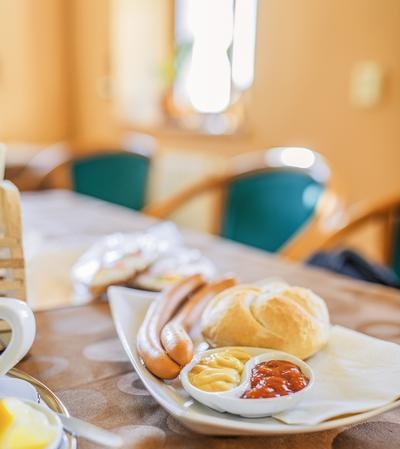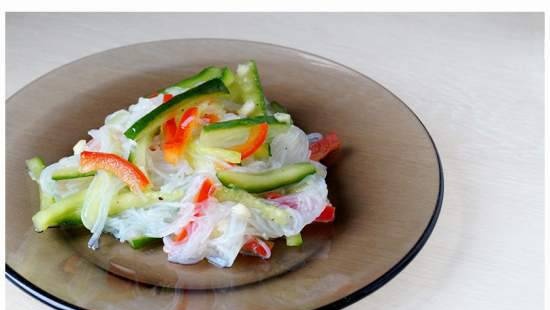|
 Nowadays, cooks are usually called culinary specialists. However, in the old encyclopedic dictionaries, the word “cooking” is absent, and if it does occur, it is not deciphered in detail. But about the cooking business is told in detail, in detail. It belongs to the field of arts. The articles were called: "Cook's Art". Nowadays, cooks are usually called culinary specialists. However, in the old encyclopedic dictionaries, the word “cooking” is absent, and if it does occur, it is not deciphered in detail. But about the cooking business is told in detail, in detail. It belongs to the field of arts. The articles were called: "Cook's Art".
In O. Henry's witty novella Love and Stomach, a girl serving restaurant patrons promises never to get married. She explains this by the fact that she was disappointed in men. After all, she only saw them chewing, chomping, destroying fried chicken, pork chops, ham and eggs... It seemed to her that all the interests of men are focused on only one thing - food. Not even just food, but grub. To the person who fell in love with her, Mamie answers firmly and decisively: no, no and no!
But it so happened that, together with this person, she ends up on an island where there is a lonely hut, and a stormy river suddenly overflows and cuts off their further path. They spend several days in a hut without food. These were the most terrible, painful days for both. The writer describes the state of his heroes extremely reliably. Blue-eyed, blond Mamie, who had previously assured that food does not exist for her, that she can get by with some tiny piece of food, is now delirious with food.
When they finally get to the first restaurant they come across, they order so much food for two that the waiter looks around in surprise: how many more people will sit at the table? After placing the order, Mamie looks at her companion with a glance that for the first time clearly reads love.
A girl comes to love through a hunger test. No wonder the story is called "Love and Stomach". It is full of hidden philosophical meaning.
No, no clever pills, pastes and pills that people of the future will supposedly swallow instead of lunch will replace (whatever the science fiction writers may say) a juicy piece of meat served on the table along with a well-done, rosy, crisp potatoes, or some other dish prepared by a skilled chef.
The most necessary profession for people is a cook!
Food is not only a simple physiological need, it has always been one of the sources of pleasure.
Oh, the kingdom of the kitchen! Who has not praised Your blue child over grilling meat,
Your light steam over golden soup?
The rooster, which, perhaps tomorrow, the cook will slaughter, sings hoarsely A merry hymn to fine art,
The most difficult and gracious ...
These lines of Eduard Bagritsky themselves sound like an enthusiastic hymn.
Aroma of sauces, gravy, delicious smell soups, roasted meat, lard breathes almost from every page of the book The Legend of Ulenspiegel.
A friend of Ulenspiegel, the fat man Lamme, becomes a cook on the Gueuze ship. He is called "the king of the kitchen, the emperor of the roast," and he proudly bears this title.
Charles de Coster, author of The Legend of Ulenspiegel, lists the dishes that Lamme used to feed a captured monk on a ship, and we learn the finest recipes from old cookbooks: grated beans in Flanders lard; grated peas with croutons; roast pigeonsstuffed with crushed nutmeg, cloves, bread crumb; a sweet stew made from beer, flour, sugar and cinnamon. The writer advises how to cook oysters: put them in a saucepan and slowly simmer with celery, nutmeg, cloves, and season the gravy with beer, flour and serve with a roast. Just listing these dishes sounds like poetry ...
 The images of cooks and cooks are poetic in the works of Andersen, the Grimm brothers, Eugene Schwartz, Yuri Olesha and other writers. The images of cooks and cooks are poetic in the works of Andersen, the Grimm brothers, Eugene Schwartz, Yuri Olesha and other writers.
They say that in our time, cooking has ceased to be a wonderful art. They say that the mechanization and automation that touched kitchens has standardized cooking: semi-finished products, they say, deprive food of individuality.
It seems that there are no grounds for concern. The art of cooking continues to be an art today, despite the fact that the original source of heat needed for cooking (wood and coal) is being replaced by gas, electricity, up to high-frequency currents. “What is our art? - Chef Vishnyakov asks one of the characters in the novel by Yuri German "Our Friends" and answers: - In that ... all food should be for the benefit of a person to one drop, to the last crumb, and, moreover, tasty. "
True, no one will cook gourmet dishes every day - there is simply no need for this. A gala reception, banquet, competition or culinary exhibition is a different matter. Here the chefs are trying to show their skills!
Along with the preparation of dishes from emerging new products (mainly seafood), old dishes have recently begun to be prepared, which were served to the table of our grandfathers and great-grandfathers.
It is known that tastes change. The sophistication of the feasts of the ancient Romans was then replaced by the unpretentiousness of the Middle Ages, which reached complete asceticism. In England, for example, for a very long time, fresh meat was not used for cooking, mainly only smoked meat was used. The menu of Anne Boleyn, the second wife of the English king Henry VIII, has come down to us. Her breakfast, for example, consisted of a pound of smoked bacon and a jug of beer ... These were the tastes of the austere 16th century - the century of Thomas More, William Shakespeare, Christopher Marlowe.
The art of cooking reached its heyday much later, and not only professional chefs, but also amateurs - scientists, philosophers, writers, composers - took part in its improvement. Jean-Jacques Rousseau was famous for his ability to cook omelettes, and the "intoxicating" Rossini - pasta; Alexandre Dumas was no less proud than The Three Musketeers, a thick cookbook he had compiled, recipes for which he collected during his travels.
The prominent Russian writer VF Odoevsky in the 1930s-1940s published culinary advice called Kitchen in the Notes for Owners section on the pages of the Literaturnaya Gazeta. He described different foods, methods of storing meat, herbs, eggs, methods of canning vegetables and fruits. Odoevsky signed his kitchen tips with the pseudonym "Doctor Poof".
What is Odoevsky! It turns out that the great Gogol himself cooked superbly. His "signature dish" was pasta, which he cooked according to some of his own recipes: "first put a lot of oil and with two sauce spoons began to stir the pasta, then put salt, then pepper and, finally, cheese and continued stirring for a long time." Citing this fact in his memoirs, S. T. Aksakov wrote: “He did this business with all his heart, as if it were his favorite craft ... If fate had not made Gogol a great poet, he would certainly be an artist. a cook. "
By the way, Gogol also showed his knowledge of cooking in his works of art. How thoroughly (and how appetizing!), For example, he told through the lips of Pulcheria Ivanovna about the mushrooms and about what pies were prepared by the "old-world landowners": pies with cheese, urda, cabbage, buckwheat porridge, "soft and a little sour."
The famous soup in a saucepan mentioned by Gogol in The Inspector General, the one that “came straight from Paris on the ship”, is by no means a lie, <not Khlestakov's fantasy. This soup was actually. Petersburg post-director K. Ya. Bulgakov, whose correspondence with his brother was published at the beginning of our century in the journal Russian Archive, back in 1821, reporting about the dinner at which he was present, mentioned that they ate turtle soup made in Ost -India and sent to Petersburg from London."Now the reasoning of food has reached such a degree of perfection that ready meals from Roberts in Paris are sent to India in some kind of tinware of a new invention, where they are kept from any spoilage," Bulgakov wrote.
Pushkin also paid attention to cooking. Admiring the taste of the cutlets, called Pozharskie, he gave cheerful verse advice in a letter to his friend Sobolevsky:
At your leisure, dine at Pozharsky's in Torzhok,
Taste the fried cutlets.
These cutlets were prepared from chicken meat and, as experts have established today, added cream to it, thanks to which the chicken meat retained its delicate and delicate flavor.
In the same message, Pushkin advised:
Order yourself in Tver
With parmazan macaroni,
Boil the eggs.
Further, Pushkin gave recommendations for cooking fresh trout: "As you see: turned blue, pour a glass of Chablis into your ear", not forgetting about such details:
So that the ear is to your heart,
It will be possible to put some pepper in boiling water,
A small piece of onion.
And what about the descriptions of the dinners at Eugene Onegin? Guided by them, you can compose an original menu: the exquisite cuisine of Eugene himself, where there will be “roast beef bloody and truffles ... French cuisine is the best color ”,“ Strasbourg's imperishable pie ”, the one that lay“ between the Limburgskiy cheese and the golden pineapple ”, and the simpler Larins:“ fat pie ”, roast and blancmange, "Russian pancakes". And if the heroes of the novel drink drinks, then Eugene Onegin has "ai", "clicquot", "burgundy", while the Larins have kvass, which "was consumed like air", lingonberry water, tea with rum, and from wines - " tsymlyanskoe ". All this testifies to Pushkin's good knowledge of both French cuisine and Russian.
Medvedev N.M. Country Cooking
Read now
All recipes
|
 Nowadays, cooks are usually called culinary specialists. However, in the old encyclopedic dictionaries, the word “cooking” is absent, and if it does occur, it is not deciphered in detail. But about the cooking business is told in detail, in detail. It belongs to the field of arts. The articles were called: "Cook's Art".
Nowadays, cooks are usually called culinary specialists. However, in the old encyclopedic dictionaries, the word “cooking” is absent, and if it does occur, it is not deciphered in detail. But about the cooking business is told in detail, in detail. It belongs to the field of arts. The articles were called: "Cook's Art".





